|
|
| ||||||||||||||||||
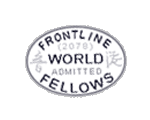 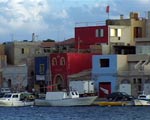 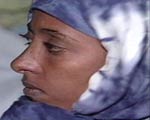 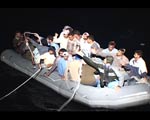 Rough Cut
| ||||||||||||||||||
| ||||||||||||||||||
|
Background
Facts and Related Links
Learn more about migration to Europe and follow links to the latest immigration statistics worldwide. 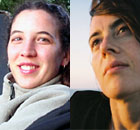
Ariana Reguzzoni (left) graduated from U.C. Berkeley Graduate School of Journalism and has worked in film and television in the Bay Area and New York City. Reguzzoni currently works at Northern Light Productions, a documentary company in Boston. Diana Ferrero (right) is a native of Rome, Italy. She came to the United States on a Fulbright scholarship in 2003 and graduated from the Berkeley journalism school in 2005. She currently works for Al Jazeera International in Washington, D.C. On the surface, the small Sicilian island of Lampedusa, perched
off the coast of North Africa, is like any other Mediterranean
tourist spot, dotted with colorful fishing villages and glorious
stretches of white sand. But as this FRONTLINE/World Fellows
report reveals, while the tourists relax, Lampedusa's coast guard is
busy patrolling the waters around the island, where hundreds of men,
women and children arrive almost daily, crammed inside barely
seaworthy boats. Arriving exhausted and dehydrated after several
days on open seas, these migrants hope they will find a better life
on European soil. In a scene that unfolds most nights during the summer and fall at Lampedusa's pier, teams from Doctors Without Borders treat the most needy coming ashore and the human cargo is then ushered to a holding center, where a controversial asylum process begins. Almost all of those who reach the island start their journey somewhere in Africa. Escaping either conflict or poverty, those who can afford it pay a local trafficker, then often spend months traveling by foot across the Sahara Desert to reach the Libyan coast, from where they make the final passage to Lampedusa. With increasing numbers of undocumented migrants finding their way to Europe this way, illegal immigration has moved up on the European Union's agenda. This July, ministers from 58 African and European nations met in Morocco to discuss how to tackle the problem. Among the measures floated were pumping more aid into Africa's poorest countries, conducting educational campaigns to warn migrants of the perils of such a journey and cracking down on the organized crime behind the trafficking trade, much of which is centered in Libya. Experts predict that this growing exodus from Africa is ready to explode into a new global Diaspora. But African nations have little incentive to stop the flow, with an estimated $8 billion having already made its way back into their ailing economies from Africans working abroad. Leaving aside the statistics and the politics of illegal immigration, reporters Ariana Reguzzoni and Italy native Diana Ferrero give us an unsettling glimpse into life for many new immigrants -- lives that are lived mostly in the shadows of their adopted country. For many they speak to, there's a palpable sadness -- even regret -- over the decision to come to Europe. The reality rarely lives up to the dream, and the sacrifices they made are rarely offset by their new life. Hermon, a soft-spoken 19-year-old from Eritrea, who works as a maid, describes how even her mother didn't know she planned to leave. "She wouldn't have let me go," she says. "She would have said, 'You will die in the sea.'" She tells Ferrero that to stay in Eritrea would almost certainly mean being recruited into Eritrea's army to fight a protracted border war with Ethiopia. To avoid conscription, girls have three choices, she says. They can get married very young, commit suicide or flee the country. Hermon chose to flee. Many scenes in the story expose just how divided and complex the issue of illegal immigration has become, from distressing images at sea, where the coast guard does its best to rescue overcrowded vessels and save lives, to the E.U. politicians who arrive to inspect the island's holding facility. Depending on a delegate's political leanings, the facility is either a place of dignity or a place of national shame. One of the most revealing moments is meeting Asmerom, another shy young Eritrean. He has been on the island for a year. Leaning in the doorway of the hotel restaurant where he works, he listens quietly as the Italian family who hired him talk about his presence in their lives. "I personally have nothing against them," says the son. "He thinks of his family, he cries. Anyway, he works and tries to move forward. He is well treated; sometimes he even eats with us. He can tell you the same. He is like a brother for us." It's an affectionate but awkward moment, laced with a discomfort that much of Europe feels as it continues to struggle with how best to deal with the immigrants arriving on its shores. Jackie Bennion
About FRONTLINE/World Fellows Our immigration story from Italy is the latest in our current round of Fellows reports, which began in December 2005 with "Brazil: Cutting the Wire" and continued in January 2006 with "Colombia: The Coca-Cola Controversy," and in April with "Japan and China: The Unforgotten War." Two other Fellows projects on Uganda and Pakistan will appear in coming months. Our Fellows program started in 2003 and so far has produced 18 multimedia stories by talented young journalists, who have traveled to Guatemala, Kashmir, Afghanistan, Haiti, Venezuela, Peru, Mexico, Egypt, Israel, Rwanda and Sicily, and journeyed across Europe by train from Istanbul to Paris. You can see them all here. Earlier this year, we solicited proposals for a new round of Fellows through our parthership with the U.C. Berkeley, Columbia and Northwestern Graduate Schools of Journalism. We are pleased to announce that the next season of Fellows projects have been selected and the recipients will be reporting stories from Liberia, China, Russia and France, among other countries. | ||||||||||||||||||
|
khartoum, sudan lodi, nj Fili Chicago - Milano, Italy M. Amell - Irving, TX Yonkers, NY zagazig, cairo Harry Lee - Kota Kinabalu, Sabah Dakar, Medina (anonymous) Pat - Freeport, NY Seattle, WA (anonymous) lolita rema - sudan, khartoum Ertrawy Ertrawy - Detroit, MI Steven Peckham - Madison, Wisconsin Selam Kidane - London, UK London, UK
| ||||||||||||||||||
![FRONTLINE/World [home]](D:\Documents and Settings\zqll4211\My Documents\PBS_files\blank(1).gif)